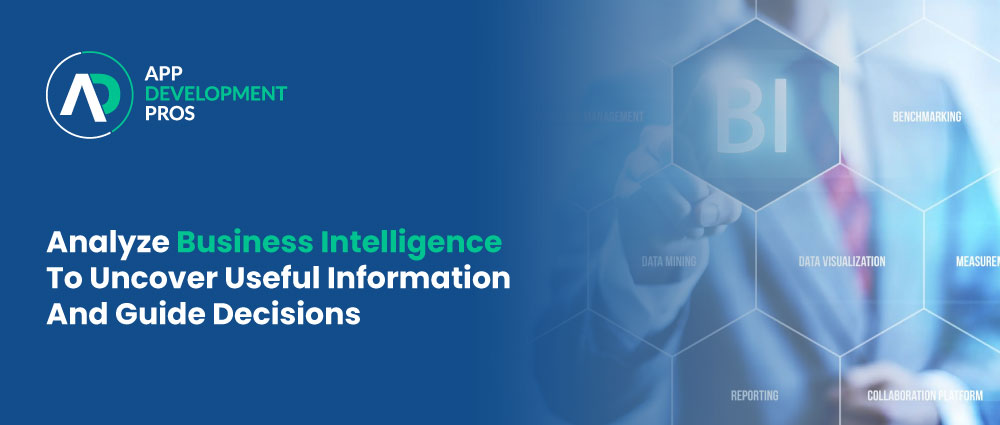Analyze Business Intelligence To Uncover Useful Information And Guide Decisions

January 5 , 2023 Posted by Admin
Software known as business intelligence (BI) ingests corporate data and displays it in understandable ways such as reports, dashboards, charts, and graphs. Business customers can now access a variety of data types, including semi-structured and unstructured data, such as social media, as well as historical and current data from both internal and external sources. Users can examine this data to learn more about how the company is doing.
BI Application Development Services are not just about creating reports, according to CIO magazine, “Although BI doesn’t advise business users what to do or what will happen if they adopt a given course, BI is also not solely about generating reports. Instead, BI App Developer provides a means for individuals to analyze data in order to recognize trends and draw conclusions.
Businesses can utilize the knowledge they acquire from data analysis and business intelligence to make better company decisions, recognize difficulties or problems, detect market trends, and discover new sources of income.
The Two Major Categories of Business Information
Strategic Business Intelligence

It is a category of business intelligence that is associated with producing reports from the data warehouse or data source and is also referred to as auto-delivered intelligence. By examining preset datasets that are pertinent to the particular process and providing a historical outlook of data, it improves business operations. The strategic intelligence model also provides a foundation for planning, goal-setting, forecasting, etc.
Strategic BI places a strong emphasis on displaying the results in graphs and charts to highlight opportunities, trends, and problem areas. It operates on four crucial factors;
- 1. Collecting and preserving the data
- 2 .Data optimization for analysis
- 3 .Recognizing the main business drivers
- 4 .Searching for solutions to important business questions
Operational Intelligence for Business
The operational and transactional data source is connected to this category of business intelligence. Checking to see if the data produced by the analysis directly aids in completing an operational task is one technique to recognize this type. Operational BI provides the operation managers and front-line staff that interact with customers with timely, pertinent information to help them with their daily tasks.
There is less need for graphs and charts because operational business intelligence is largely task-focused. This is demonstrated by the fact that a graph will not be effective in informing a member of the operational domain that clients have unpaid dues. They would want a succinct message.
Because of this, operational BI heavily relies on communication tools like email, instant messages, and dashboards. Schedules, invoices, shipping documents, and financial statements are the output that one receives from operational business intelligence.
The Functions of Business Intelligence

Even while firms utilize business intelligence in a variety of methods to achieve a variety of goals, the process is generally the same across all industries –
- A data warehouse is where information from various sources, including both internal and external market data from the organization, is combined and kept.
- By developing solid data analysis models, data sets are created and prepared for analysis.
- The models and data sets are then subjected to queries by the data analysts.
- In addition to BI dashboards and reports, visualizations in the form of graphs, charts, and histograms, etc., are also made using the query results.
- The reports are used by the decision-makers to determine what is working and what needs to change in order to make important business decisions.
Tools for Business Intelligence (BI) In Enterprises
Depending on the BI use cases for their organization, enterprises can install a variety of BI technologies. Some of these tools are;
- 1. Data mining applications
- 2. Processing analytical data online (OLAP)
- 3. Reporting tools
- 4. Data warehousing applications
- 5. Tools for business performance management
What Are The Various Advantages Of Business Intelligence?

There are numerous business uses for BI. There is a use case for the technology in every domain. Let’s explore them further.
Quick and Accurate Reporting
Using BI, staff may monitor KPIs using a range of data sources, including operational, sales, and financial data, using customized reports or templates. These reports can be produced instantly and used by enterprises to take immediate action.
Gaining Business Insights
Using BI solutions, businesses can readily measure their revenue, employee productivity, and the performance of individual departments. It can assist in highlighting the company’s faults and strengths while providing them with information on what is and isn’t functioning. Businesses can even configure notifications in BI solutions to stay on top of changes in the KPIs that are important to them.
Better Customer Satisfaction

Business intelligence technologies can give companies an inside look at the patterns and actions of their customers, even through web app development. Since the technologies are made to track consumer feedback in real time, they can assist businesses in retaining current clients while also attracting new ones by acting promptly and anticipating their demands.
Finding New Opportunities
Businesses can gain a competitive edge by spotting trends and developing data-driven initiatives. To discover trends in both customer experience and market situations, the staff can combine external market data with their internal sales journey.
Improved Operational Effectiveness
Business intelligence tools combine multiple data, which benefits the entire organization across domains. This causes the managers to spend less time looking for information and more time concentrating on producing accurate and timely reports.
This frees up the employees to concentrate on how their work affects the immediate and long-term corporate objectives.
Better Revenue

For each business or startup, high income is the ultimate goal. Businesses may ask better questions and quickly detect flaws with the data gathered by BI tools. The BI tools can assist in analyzing revenue gaps and revealing opportunities to increase margins. Together, these factors can aid organizations in developing better plans for allocating budgets in order to maximize income.
Conclusion
Business intelligence (BI) is a technology-driven method for data analysis and information delivery that aids managers, employees, and executives in making wise business decisions. In order to make the analytics results available to business users for operational decision-making and strategic planning, organizations collect data from internal IT systems and external sources, prepare it for analysis, run queries against the data, and create data visualizations, BI dashboards, and reports. If you are looking for an app development company and web app development services then get in touch with App Development Pros.
Services

We at App Development Pros, a renowned mobile app development company, are like superheroes of the smartphone app world! We provide digital opportunities in the mobile app design form and help you turn fantastic ideas into powerful mobile apps for your business needs. Our top-notch app development services build the perfect mobile applications for your needs by working closely with you, making us one of the USA's best mobile app development companies.
2025 (c) App Development Pros - Privacy Policy - All Rights Reserved



































Leave a Reply